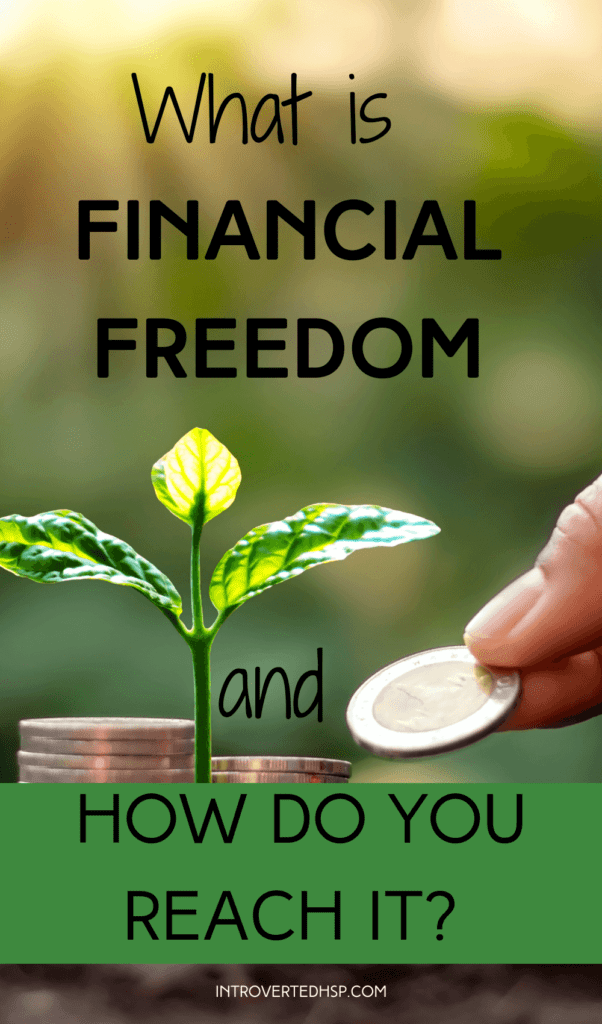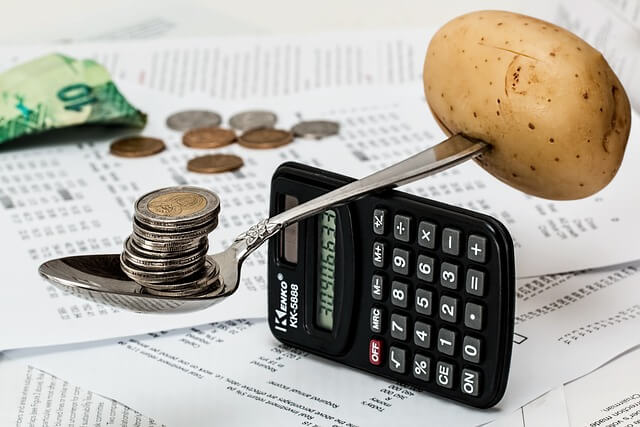
This post may contain affiliate links, which means if you make a purchase through these links, I may receive a small commission at no extra cost to you. As an Amazon Associate I earn from qualifying purchases. Please read my disclosure for more info.
Definition of Financial Freedom
Everyone wants to have financial freedom but what does this even mean? To be financially free can mean something else to each person. Here is a general definition that suits most people.
Financial freedom means having the freedom to do whatever you want whenever you want it. Not having to work for survival but going to work because you want to. Having enough money to live a life you love. It’s about not worrying that you don’t have enough money to support yourself and your family.
Some people will need a whole lot of money in order to live the life of their dreams and not worry about money at all, while others feel that they are financially free when all of their debt is paid off and they own a house.
It’s so different for everyone! Here are a few steps to follow to get closer to what financial freedom means to you!
Let’s dive in!

How to Reach Financial Freedom Step-by-Step
1. Define Your Financial Goals
Your way to financial freedom starts with exploring your personal reasons why you want to reach this.
Do you want to quit the 9-5 job you hate? Do you want to reduce the hours you spend at work to improve your work-life balance? Maybe you want to pursue your dream job but this doesn’t pay so well so you can’t do this right now. It’s also possible that you want more freedom to explore the world and travel full-time.
Think about all your financial goals and what you want to achieve in your life. Why do you want more free time, to do what exactly? Do you want to spend more time with family and friends or do you want to pursue a hobby that you love? This can motivate you to stay consistent with the next steps.
Intrinsic motivation is so important, you are doing this because you want this, because of your own goals! Nobody is telling you to start saving like a maniac because you have to do it, no!
You are doing this for you and maybe for your family, this is the best motivation you can have. If you don’t really want this, you can keep living paycheck to paycheck, I’m not stopping you.
Know your goals and why you want to reach them. When you are motivated enough, being disciplined will get easier.
2. Know what you have
It is very important to know what your personal financial situation looks like.
Your Debt
Make a list of all the debts you owe. This can be student loans, credit card debt, a mortgage, or money you owe a friend or family member. Add everything up to see what you have to pay back in total. Also check the interest rates of everything, see which debt has the highest and which one has the lowest.
Your Assets
Your assets are everything that you have and that is worth some money. This can be your savings, your retirement contributions, your investments but also valuable items, and even your house if it’s paid for. You can count your income and other income streams as well, but keep in mind that you can lose this income if you lose your job.
Total
You can now calculate how much money you have or you owe in total by deducting your total debt from your total assets. In the best-case scenario, you have more money than you owe. If this is not the case, there is still hope for you! Keep reading to get you out of your debt!
3. Keep a Budget
To have more control over your financial situation, you must know what’s coming in and going out every day. Having a budget will help you to have a good overview of your financial situation. If you don’t know where to start, you can read this post about budgeting for beginners.
You can keep all of your financial information in an excel sheet or if you like paper planners like me, in a nice, easy and budget-friendly budget planner.
Everyone should have a budget but when you want to reach financial freedom, you should start budgeting!
Budgeting starts with tracking your income and expenses and seeing where all your money is going. Then you can analyze all the different categories in which you spend money and also see if there is an overspending problem. Without knowing where your money is going, how would you be able to save more money? You won’t. So start budgeting today!

4. Basic Emergency Fund
When you know where your money is going, what you have, and what you owe it’s time to start saving to set up a small emergency fund. This could be as small as 1000 dollars. You could start saving with a smaller amount of money each month to definitely reach your monthly goal. If your income allows it, up the contribution to your emergency fund.
This is just the start of your emergency fund but it’s good to have something for when an emergency like a medical emergency or car accident might happen. It’s always unexpected, and that is what an emergency fund is for! Make it and use it when necessary! Don’t forget to refill it when it’s empty ;).
5. Pay Off Debt
Your first priority after setting up an emergency fund should be to pay off your debt as soon as possible. Especially high-interest debt! Try to pay off your high-interest debt first as this will save you a lot of money on interest fees. Any debt that gets paid off is a step in the right direction!
To be debt-free is amazing, but it can be a long road to get there. Don’t lose your motivation by using tools to help you. You can use debt trackers to keep track of your progress. Maybe start with a smaller amount of debt so that you will have an achievement pretty soon! Financial freedom here we come!
6. Grow your Emergency Fund
When you pay off your debt, it can be great to add some more money to your emergency fund.
1000 dollars won’t get you very far so it’s better to save for a few months of expenses. Most people say that 6 months of expenses is a good idea. If you would lose your job, it mostly takes a few months until you find a new job.
Calculate the cost of your basic living expenses and save up for those in an emergency fund. You could always save more, in case a big emergency happens that isn’t losing your job.
It will give you a sense of financial freedom when you have built a good emergency fund.

7. Sinking Funds and Financial Goals Savings
Sinking funds are great for saving up for your specific financial goals. I wrote a blog post about this, you should definitely check it out to learn more about them!
Sinking funds look a lot like savings accounts where you save for expenses you know are coming or for financial goals you might have. It’s not like a regular savings account where you just save your money without a specific purpose. Sinking funds are more intentional, every penny has a purpose.
When you give your money a purpose, it’s easier to keep saving because you know why you are doing so. When you are just saving for the heck of it, it will be easier to take money out to buy something fun.
8. Save More Money
Try to save more money in general! Find out where your money is leaking away from tracking your expenses every month and see what you can change to save more. There are so many ways to save more money. The internet is full of tips and tricks on how to pay less and save more. Here is one of my blogposts on how to save money on groceries.
Saving money by living more frugally is a great way to save a lot more than you were saving before. However, this isn’t a long-term plan most of the time. To live a life in financial freedom also means that you can do whatever you want. When you live very frugally all the time, I don’t think that this is how you pictured your dream life to be. You could live extremely frugally for a period of time so you are able to save more. When you have saved a good amount you can put your money to work so that you can reap the benefits at some point.
This saving money principle has a limit, unfortunately. There will be a moment where you can’t save any more money and when you are at this moment, it’s time for the next step. Make more money!
9. Make More Money
If you have a job, good for you! You have one income stream already set! Most of the time, your day job won’t make you rich or lead to financial freedom (unless you have a high-paying job and a good financial strategy).
Look into extra earning possibilities after work or during the weekends. This will be an extra income that you have to work for. You have to trade your time for money so this is a source of active income.
You only have that many hours in a day, so you could also look into sources of passive income. Passive income is generated without active working hours at the moment you earn it. In most cases, this passive income isn’t passive from the start, you have to work for it to get it going but after a while, it gets more passive.
A few examples of passive income streams: investing, renting out a house, starting a blog or YouTube channel, selling print-on-demand items, selling digital printables, selling e-books, having online courses, etc.
The beauty of passive income is that you earn money while you are sleeping. This is something you should look into if you dream of a financially free future.

10. Stay Motivated
After all your hard work, budgeting, tracking everything, and saving all your money, you will get tired of it, understandably! It’s very normal to get tired of saving money because spending it is so much fun! Financial freedom won’t happen overnight.
Allow yourself some money to spend. You could add a fun spending category into your sinking funds for when you feel tempted to spend all your money! It’s certainly better to have a set amount of money for fun spending than recklessly spending a whole lot because you feel you’ve had enough of it!
It could also help if you create a vision board to keep your eyes on the prize. Make a vision board with pictures, quotes, and even target numbers to look at every day.
Saving trackers can also help you as it is fun to check off your goals when you reach them. You could also add a prize to some particular goals when you reach them.
Conclusion
Most of us desire financial freedom, but to get there, you have to put in some work first. Make a plan, figure out how much money you need to get there, and start working towards it!
Financial freedom won’t come to you overnight but if you are persistent and dedicated, it can happen for you too!
Try to make as much money as you can while saving the best you can and let your money work for you after a while.
Financial freedom is great, but what is it really that you want? Money will make things easier for you but don’t forget to enjoy your life while you are working towards your financially free life!
I wish you all a financially free life!
